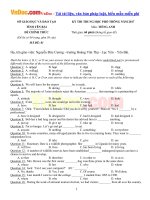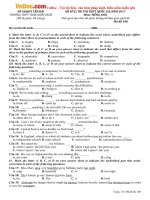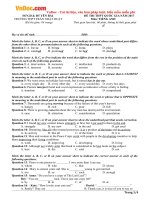Tải Đề thi thử THPT Quốc gia năm 2017 môn Tiếng Anh trường THPT Trần Nhật Duật, Yên Bái CÓ ĐÁP ÁN (1) - Thư viện Đề thi THPT Quốc gia môn Tiếng Anh năm 2017
Bạn đang xem bản rút gọn của tài liệu. Xem và tải ngay bản đầy đủ của tài liệu tại đây (125.78 KB, 6 trang )
<span class='text_page_counter'>(1)</span><div class='page_container' data-page=1>
<b>SỞ GIÁO DỤC VÀ ĐÀO TẠO YÊN BÁI</b>
<b> TRƯỜNGTHPT TRẦN NHẬT DUẬT</b>
<i>(Đề thi có 05 trang)</i>
<b>KỲ THI TRUNG HỌC PHỔ THÔNG QUỐC GIA NĂM 2017</b>
<b>Môn: TIẾNG ANH</b>
<i>Thời gian làm bài: 60 phút, không kể thời gian phát đề</i>
<i><b>Mark the letter A, B, C, or D on your answer sheet to indicate the word whose underlined </b></i>
<i><b>part differs from the other three in pronunciation in each of the following questions.</b></i>
<b>Question 1: A. adventure</b> B. future C. mature D. figure
<b>Question 2: A. young </b> B. plough C. couple D. cousin
<i><b>Mark the letter A, B, C, or D on your answer sheet to indicate the word that differs from the other </b></i>
<i><b>three in the position of primary stress in each of the following questions.</b></i>
<b>Question 3: A. accuracy</b> B. Canada C. banana D. countryside
<b>Question 4: A. contaminate B. continent</b> C. conquer D. Comfortable
<i><b>Mark the letter A, B, C, or D on your answer sheet to indicate the underlined part that needs</b></i>
<i><b>correction in each of the following questions.</b></i>
<b>Question 5: The skin receives nearly the third of the blood pumped out by the heart.</b>
A B C D
<b>Question 6: I had my motorbike repair yesterday but now it still doesn’t work.</b>
A <b> B C</b> D
<b>Question 7: If you are working with young children in a primary school, you will find that teaching </b>
A B C
lively songs and rhymes are very popular.
D
<i><b>Mark the letter A, B, C, or D on your answer sheet to indicate the correct answer to each of the </b></i>
<i><b>following questions.</b></i>
<i><b> Question 8: I’m sorry, but I just can’t____ your behaviour any longer.</b></i>
A. go along with B. get on with C. keep up with D. put up with
<b>Question 9: It is doubtful whether newspapers____ governments to any great degree.</b>
A. draw B. influence C. catch D. attract
<b>Question 10: Many companies____ to take part in illegal logging.</b>
A. denied B. rejected C. protested D. refused
<b>Question 11: The music____ the composer’s joy of life.</b>
A. arouses B. appeals C. expresses D. attracts
<b>Question 12: The Grand Canyon is the product of centuries of____</b>
A. erosion B. decay C. crumbling D. deterioration
<b>Question 13: By the 1300s, the Spanish had learnt that gunpowder could____ propel an object with </b>
incredible force.
A. using it to B. used to C. be used to D. been used to
<b>Question 14: Tennessee has about 140 newspapers,____ 25 are issued daily.</b>
A. of which about B. which is about C. about which D. which are about
<b>Question 15: When consumers cannot have everything that they want, they have to choose____ most.</b>
A. they want what B. what they want C. they want it D. that they want
<b>Question 16: Rodney____ for the company for very long before he was promoted.</b>
A. hadn’t been working B. hasn’t been working C. didn’t used to work D. didn’t work.
<b>Question 17: “Do you think Harry will want something to eat after he gets here?”</b>
“I hope not. It’ll probably be after midnight, and we____.”
</div>
<span class='text_page_counter'>(2)</span><div class='page_container' data-page=2>
<b>Question 18: Mr. Lee was upset by____ him the truth.</b>
A. us not tell B. we didn’t tell C. not to tell D. our not having told.
<b>Question 19: ____ for the fact that he was working abroad, he would have helped win the project.</b>
A. Had it been B. Hadn’t it been C. If it hadn’t been D. If it had been
<i><b>Mark the letter A, B, C, or D on your answer sheet to indicate the most suitable response to </b></i>
<i><b>complete each of the following exchanges.</b></i>
<b>Question 20: Peter:“I’ve been awarded a scholarship to study in America.”</b>
Kate: “Uh, really? _____!”
<b>A. Take care of yourself</b> <b>B. Lucky as you are</b>
<b> C. You are always lucky D. Congratulations </b>
<b>Question 21: Jane:“Would you mind if I use you computer for an hour?” Tony:”________”</b>
A. Not at all. I’ve finished my job B. Yes, you can use it.
C. Of course not. I still need it now D. Yes, It’s all right
<i><b>Mark the letter A, B, C, or D on your answer sheet to indicate the word(s) CLOSEST in meaning to </b></i>
<i><b>the underlined word(s) in each of the following questions.</b></i>
<b>Question 22: Usually the eggs are attached to a tree with a sticky type of glue.</b>
<b>A. broken</b> <b>B. stuck</b> <b>C. come</b> <b>D. remained</b>
<b>Question 23: Besides helping his team to great victories, Messi achieved amazing things for himself.</b>
<b>A. games</b> <b>B. goals</b> <b>C. championships</b> <b>D. wins</b>
<i><b>Mark the letter A, B, C, or D on your answer sheet to indicate the word(s) OPPOSITE in meaning to </b></i>
<i><b>the underlined word(s) in each of the following questions.</b></i>
<b>Question 24: Although it’s a long day for us, we feel we are contented with what we do.</b>
<b>A. shocked</b> <b>B. dissatisfied</b> <b>C. excited</b> <b>D. interested</b>
<b>Question 25: I can’t stand people who treat animals cruelly.</b>
<b>A. brutally</b> <b>B. cleverly</b> <b>C. gently</b> <b>D. reasonably</b>
<i><b>Mark the letter A, B, C, or D on your answer sheet to indicate the sentence that is closest in </b></i>
<i><b>meaning to each of the following questions.</b></i>
<b>Question 26: His parents made him study for his exams.</b>
A. He was made study for the exams by his parents.
B. He was obliged to study for the exams by his parents.
C. He is made to study for the exams by his parents.
D. He was made to study for the exams by his parents.
<b>Question 27: “I was not there at the time” he said. </b>
A. He denied being there at the time. B. He denied that he was there at the time.
C. He denied not being there at the time. D. He denied that he wasn’t there at the time.
<b>Question 28: It's a waste trying to do the experiment again and again.</b>
<b>A. The experiment should be done again and again.</b>
<b>B. It's well worth trying to do the experiment .</b>
<b>C. There is no point in trying to repeat the experiment.</b>
<b>D. There is no time to try to repeat the experiment.</b>
<i><b>Read the following passage and mark the letter A, B, C, or D on your answer sheet to indicate the </b></i>
<i><b>sentence that best combines each pair of sentences in the following questions.</b></i>
</div>
<span class='text_page_counter'>(3)</span><div class='page_container' data-page=3>
C. Although they were late, they found some good seats.
D. They had to stand for the whole show.
<b>Question 30: He started to play the guitar five years ago.</b>
A. He has been playing the guitar since five years.
B. He has been playing the guitar for five years.
C. He has been starting to play the guitar for five years.
D. He has started playing the guitar for 5 years.
<i><b>Read the following passage and mark the letter A, B, C, or D on your answer sheet to indicate the </b></i>
<i><b>correct word or phrase that best fits each of the numbered blanks from 31 to 35.</b></i>
I was born to dance. I've been dancing all my life, ever since my mother, (31) gave up a
dancing career on the stage when she married my father, picked me up and twirled me around as an infant.
As much as I loved dancing with her, her greatest gift to me was her "unconditional love" during her
lifetime.
My parents (32) after only 5 years of marriage, but my father remarried a lovely lady who
also loved to dance. They used to (33) me to a dancing club where I would listen to the music
and watch them dance-occasionally my stepmother, Mary, invited me to dance.
I also met my wife, Charlotte, in a dancing party. I danced with her for about 15 minutes, and during
that brief span, I realized that I fell in love (34) her. We kept dancing throughout our marriage.
My earliest memories of dancing with my daughters started when I came home from work to our small
home in Marblehead, Massachusetts, and my daughter Laura was about 3 years old. It was very relaxing
for me to (35) the record player, pick up Laura in my arms, and dance her around the room!
<b>Question 31:.A. he </b> <b> B. who </b> C. whom D. whose
<b>Question 32: A. divorced B. promised C. engaged D. loved</b>
<b>Question 33: A. taking B. to take C. took </b> D. take
<b>Question 34: A. from B. to </b> C. of D. with
<b>Question 35: A. turn on B. turn off C. turn down </b> D. turn into
<i><b>Read the following passage and mark the letter A, B, C, or D on your answer sheet to indicate the </b></i>
<i><b>correct answer to each of the questions from36 to 42.</b></i>
<i> </i>
Until recently, most American entrepreneurs were men. Discrimination against women in business,the demands of caring for families, and lack of business training had kept the number of women
entrepreneurs small. Now, however, businesses owned by women account for more than $40 billion in
annual revenues, and this figure is likely to continue rising throughout the 1990s. As Carolyn Doppelt
Gray, an official of the Small Business Administration, has noted, "The 1970s was the decade of women
entering management, and the 1980s turned out to be the decade of the woman entrepreneur". What are
some of the factors behind this trend? For one thing, as more women earn advanced degrees in business
<i><b>and enter the corporateworld, they are finding obstacles. Women are still excluded from most executive</b></i>
suites. Charlotte Taylor, a management consultant, had noted, "In the 1970s women believed if they got an
<i><b>MBA and worked hard they could become chairman of the board. Now they've found out that isn't going</b></i>
to happen, so they go out on their own".
</div>
<span class='text_page_counter'>(4)</span><div class='page_container' data-page=4>
Of course, many women who start their own businesses fail, just as men often do. They still face
hurdles in the business world, especially problems in raising money; the banking and finance world is still
dominated by men, and old attitudes die hard. Most businesses owned by women are still quite small. But
the situation is changing; there are likely to be many more Sandra Kurtzigs in the years ahead.
<b>Question 36: What is the main idea of this passage?</b>
A.Women today are better educated than in the past, making them more attractive to the business world.
B.The computer is especially lucrative for women today.
C. Women are better at small business than men are.
D. Women today are opening more business of their own.
<i><b>Question 37:The word “excluded “ in line 8 is closest in meaning to_____.</b></i>
A. not permitted in B. often invited to C. decorators of D. charged admission to
<b>Question 38: All of the following were mentioned in the passage as detriments to women in the business </b>
world EXCEPT___.
A.Women were required to stay at home with their families.
B. Women lacked ability to work in business.
C.Women faced discrimination in business.
D.Women were not trained in business.
<i><b>Question 39: in line 10, “that” refers to____.</b></i>
A. a woman becomes chairman of the board. B. Women working hard
C. Women achieving advanced degrees D. Women believing that business is a place for them.
<b>Question 40: According to the passage, Charlotte Taylor believes that women in 1970s ____.</b>
A. Were unrealistic about their opportunities in business management.
B.Were still more interested in education than business opportunities
C.had fewer obstacles in business than they do today.
D. were unable to work hard enough to success in business.
<b>Question 41: It can be inferred from the passage that the author believes that business operated by women</b>
are small because____.
A. Women prefer a small intimate setting. B. Women can’t deal with money.
C. Women are not able to borrow money easily. D. Many women fail at large businesses.
<b>Question 42:The author’s attitude about the future of women in business is____.</b>
A. skeptical B. optimistic C. frustrated D. negative
<i><b>Read the following passage and mark the letter A, B, C, or D on your answer sheet to indicate the </b></i>
<i><b>correct answer to each of the questions from 43 to 50.</b></i>
Basic to any understanding of Canada in the 20 years after the Second World War is the country’s
<i><b>impressive population growth. For every three Canadians in 1945, there were over five in 1966. In</b></i>
<i><b>September 1966 Canada’s population passed the 20 million mark. Most of his surging growth came from</b></i>
natural increase. The depression of the 1930’s and the war had held back marriages, and the catching-up
process began after 1945. The baby boom continued through the decade of the 1950’s, producing a
population increase of nearly fifteen percent in the five years from 1951 to 1956. This rate of increase had
been exceeded only once before settle. Undoubtedly, the good economic condition of the 1950’s
<b>supported a growth in the population, but the expansion also derived from a trend toward earlier</b>
marriages and an increase in the average size of families. In 1957 the Canadian birth rate stood at 28 per
thousand, one of the highest in the world.
</div>
<span class='text_page_counter'>(5)</span><div class='page_container' data-page=5>
It appeared that Canada was once more falling in step with the trend toward smaller families that
had occurred all through the Western world since the time of the Industrial Revolution.
Although the growth in Canada’s population had slowed down by 1966 (the increase in the first
half of the 1960’s was only nine percent), another large population wave was coming over the horizon. It
would be composed of the children who were born during the period of the high birth rate prior to 1957.
<b>Question 43: What does the passage mainly discuss?</b>
A. Educational changes in Canadian society. B. Canada during the Second World war.
C. Population trends in postwar Canada. D. Standards of living in Canada.
<b>Question 44: According to the passage, when did Canada’s baby born begin?</b>
A. In the decade after 1911 B. After 1945
C. During the depression of the 1930’s D. In 1966
<i><b>Question 45:The word “five” refers to____.</b></i>
A. Canadians B. years C. decades D. marriages
<b>Question 46:The author suggests that in Canada during the 1950’s____.</b>
A. the urban population decreased rapidly B. fewer people married.
C. economic conditions were poor. D. the birth rate was very high.
<i><b>Question 47:The word “trend” is closest in meaning to____.</b></i>
A. tendency B. aim C. growth D. directive
<b>Question 48: When was the birth rate in Canada at its lowest population level?</b>
<b>A. 1966</b> B. 1957 C. 1956 D. 1951
<b>Question 49: The author mentions all of the following as causes of declines in population growth after </b>
1957 EXCEPT____.
A. people being better educated B. people getting married earlier.
C. better standards of living. D. couples buying houses.
<b>Question 50: It can be inferred from the passage that before the Industrial Revolution</b>
A. families were larger B. population statistics were unreliable
C. the population grew steadily. D. economic conditions were bad.
</div>
<span class='text_page_counter'>(6)</span><div class='page_container' data-page=6>
<b>SỞ GIÁO DỤC VÀ ĐÀO TẠO YÊN BÁI</b>
<b> TRƯỜNGTHPT LÝ THƯỜNG KIỆT</b>
<b>ĐÁP ÁN KỲ THI TRUNG HỌC PHỔ THƠNG</b>
<b>QUỐC GIA NĂM 2017</b>
<b>Mơn: TIẾNG ANH</b>
<i>Thời gian làm bài: 60 phút, không kể thời gian phát đề</i>
1. C 11. C 21. D 31. B 41. C
2.B 12.A 22.B 32.A 42.C
3.C 13.C 23.D 33.D 43.C
4.A 14.A 24.B 34.D 44.B
5.B 15.B 25.C 35.D 45.A
6.B 16.A 26.D 36.D 46.D
7.D 17.C 27.A 37.A 47.A
8.B 18.D 28.C 38.B 48.A
9.D 19.C 29.A 39.A 49.B
10.B 20.D 30.B 40.A 50.A
</div>
<!--links-->









